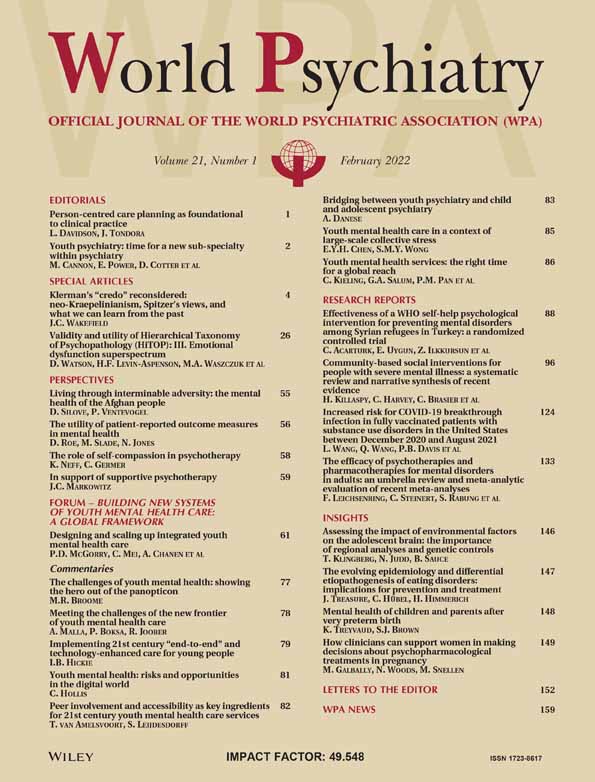Predicting the outcome of psychotherapy for chronic depression by person-specific symptom networks.
IF 73.3
1区 医学
Q1 Medicine
引用次数: 0
Abstract
Psychotherapies are efficacious in the treatment of depression, albeit only with a moderate effect size. It is hoped that personalization of treatment can lead to better outcomes. The network theory of psychopathology offers a novel approach suggesting that symptom interactions as displayed in person-specific symptom networks could guide treatment planning for an individual patient. In a sample of 254 patients with chronic depression treated with either disorder-specific or non-specific psychotherapy for 48 weeks, we investigated if person-specific symptom networks predicted observer-rated depression severity at the end of treatment and one and two years after treatment termination. Person-specific symptom networks were constructed based on a time-varying multilevel vector autoregressive model of patient-rated symptom data. We used statistical parameters that describe the structure of these person-specific networks to predict therapy outcome. First, we used symptom centrality measures as predictors. Second, we used a machine learning approach to select parameters that describe the strength of pairwise symptom associations. We found that information on person-specific symptom networks strongly improved the accuracy of the prediction of observer-rated depression severity at treatment termination compared to common covariates recorded at baseline. This was also shown for predicting observer-rated depression severity at one- and two-year follow-up. Pairwise symptom associations were better predictors than symptom centrality parameters for depression severity at the end of therapy and one year later. Replication and external validation of our findings, methodological developments, and work on possible ways of implementation are needed before person-specific networks can be reliably used in clinical practice. Nevertheless, our results indicate that the structure of person-specific symptom networks can provide valuable information for the personalization of treatment for chronic depression.通过个人特定症状网络预测慢性抑郁症心理疗法的疗效。
心理疗法对治疗抑郁症有一定疗效,尽管效果一般。人们希望个性化治疗能带来更好的疗效。精神病理学网络理论提供了一种新的方法,认为特定个人症状网络中显示的症状相互作用可以指导针对个人患者的治疗计划。在对 254 名慢性抑郁症患者进行了为期 48 周的特定障碍或非特定心理治疗后,我们研究了特定个人症状网络是否能预测治疗结束时以及治疗终止后一年和两年内观察者评定的抑郁症严重程度。特异性症状网络是根据患者评分症状数据的时变多层次向量自回归模型构建的。我们利用描述这些特定人群网络结构的统计参数来预测治疗结果。首先,我们使用症状中心度量作为预测指标。其次,我们使用机器学习方法来选择描述症状配对关联强度的参数。我们发现,与基线时记录的普通协变量相比,特异性症状网络信息大大提高了治疗终止时观察者评定的抑郁严重程度预测的准确性。这同样适用于预测一年和两年随访时观察者评定的抑郁严重程度。对于治疗结束时和一年后的抑郁严重程度,症状配对关联比症状中心性参数的预测效果更好。要想在临床实践中可靠地使用特定人群网络,还需要对我们的研究结果进行复制和外部验证、方法论上的发展以及可能的实施方法。尽管如此,我们的研究结果表明,特定人群症状网络的结构可以为慢性抑郁症的个性化治疗提供有价值的信息。
本文章由计算机程序翻译,如有差异,请以英文原文为准。
求助全文
约1分钟内获得全文
求助全文
来源期刊

World Psychiatry
Nursing-Psychiatric Mental Health
CiteScore
64.10
自引率
7.40%
发文量
124
期刊介绍:
World Psychiatry is the official journal of the World Psychiatric Association. It aims to disseminate information on significant clinical, service, and research developments in the mental health field.
World Psychiatry is published three times per year and is sent free of charge to psychiatrists.The recipient psychiatrists' names and addresses are provided by WPA member societies and sections.The language used in the journal is designed to be understandable by the majority of mental health professionals worldwide.
 求助内容:
求助内容: 应助结果提醒方式:
应助结果提醒方式:


